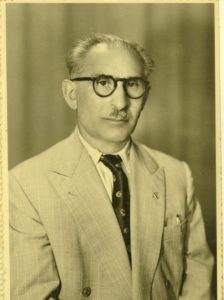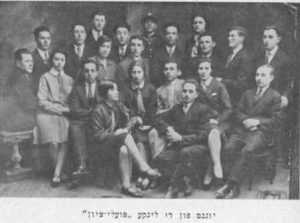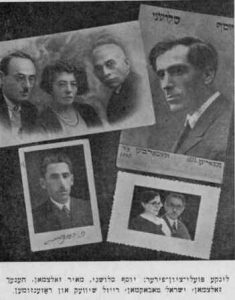
But when we met face-to-face with our opponents in the city, the “Terrible Capitalists of Siedlce” – “The factory Owners“, whose factories stood between their beds, their wives pleaded:”What do you want from us? On the contrary, take my husband to work as a hired hand, so at least I’ll have Shabbat needs!” – then we began to see reality in other eyes. In our daily activity among the Jewish workers, our enthusiasm cooled, and we disappointedly asked ourselves: “Is this the same struggle that we read about in the pamphlets?”. From day to day we felt suffocation in the lines of the Bund, which, itself, saw us as a foreign element and removed about ten young men and women from our group from the party. I was known then as a propagandist of the Bund with a certain amount of impact on the crowd and managed to extract about twenty young men and women out of the party. We were thirty young people, without political activity – until Zionism took us in.
The establishment of “Poalei Zion”

Not even the ranks of the Zionist movement did we find satisfaction. My friend and I already had a defined propaganda plan of we distributed among these new to our group. The program presented a cohesive political platform: the Jewish worker must continue the class struggle in the interests of his daily life, even though this struggle results in a completely different outcome than in people with normal way of life: it leads to immigration. And this should be directed to Eretz-Israel, where the basis for normal class struggle ending with socialism will be created. Theorists of the new movement, Mottel Kaz’nitzki and myself, wondered how we should be called and finally adopted the name “new Zionist workers”.
With our party platform we drafted into our ranks once dozens activists, yet we were not sure of our opinions and the way we tried to deal with our problems. We were startled, by the tremors we’ve generated, so in the end we decided to join the movement “Tehiya” (Rebirth).
In the first joint meeting, which was very festive, attended only three from our side: Motel Kaz’nitzki, Abraham Zilberstein and myself. Representing “Tehyia” were the board members Gurevich – the leader, Shoemaker Peretz Kamar , high school student Shlomo Weintroib , Meir Rozenwaser who worked in his father making cigarettes, schoolgirl Liba Eisenstadt and bookbinder Motel Barenboim . At the end of the meeting it was decided that we will continue to conduct our proletarian operations visibly, and it was agreed to hire a room for clandestine activity, because the club will have propaganda activities only.
We were very impressed by the first articles of Dov Baer Borochov, published in the Journal of the Zionist Russian language “Iooriiskaih Z’izn” (Jewish life) and dealing with various Jewish economic issues. We swallowed every word. We discovered a new world of thought and study. We found that the beliefs we’ve adopted and formed for ourselves are compatible with the views expressed by the founder and leader of “Poale Zion”. Encouraged, we intensified our activities, all in the spirit of the leader: We obtained weapons for self-defense – guns and daggers were especially produced by a blacksmith, we organized several successful strikes of footwear workers and salesmen, we held discussions with the “Bund”, and translated into Yiddish all articles of Borochov, which originally appeared in a Russian magazine, and distributed them among workers who memorized them enthusiastically.
Under the wings of the “Tehyia” movement our number grew to hundreds of members. Between the most active ones, except for me, were Israel Tabakman Mottel Kaz’nitzki, Meir Rosenwasser, Mottel Barenboim, Peretz Kamar, Gabriel Shlachter, Mottel Teiblum (a Hasid), Menachem (named Ben-Hillel, in Israel today), Nahum Sloshni, Moses Gringold and Abraham Silberstein . We had activity for girls, as well, which included Liba Eisenstadt joined by Ithaca Kahn, Ithaca Sloshne, Hanna Sloshne and many others. We already possessed quite a lot of political literature, and the new series of Baer Borokhov in “Iooriiskaih Z’izn “-” Of class interests and the national problem “, has made a strong impression on us and emphasized our loyalty even more.
After a while, during two days of a multi-participant discussion, we decided to establish the “Poalei Zion” movement in Siedlce.
During the 1905 revolution
We grew up and grew stronger to so that no political or economic activity took place in the city without us.
The “Bund” and PPS (Polish Socialist Party) ran the self-defense and we participated in organizing the defense. We divided the city to sections and each night armed groups guarded them. We sent groups of self-defense to the surrounding area out of Siedlce.
With those two comrade parties, we have taken part in managing the big strike of Commerce-employees, which was a success, and the strike of non-professional shoemaker employees, which went on for weeks. We also participated in illegal demonstrations and waved flags. When the Cossacks came to disperse the protesters, we folded the flags and pretended to be innocent travelers. These antics led the rioters into such a rage killing anyone in their path.
1905 presented “Poalei Zion” in Siedlce with heavy tasks. The revolutionary events in the Russian Empire did not spare our city and at the decision of our committee a party militia of volunteers was established, besides the self-defense organization. Militia members were armed with pistols and “Mauser” rifles which were smuggled from a military base in the city. On May 1st, we made the merchants close their shops, and demonstrations were attended by our friends en masse. With the strengthening of our position few members were selected for special tasks. For operations in the province – the immediate environment – Tabakman , David Arz’ac and myself. For the center and the provisioning of an illegal literature: comrade Menachem. For professional activities: Mottel Kaz’nitzki and Abraham Zilberstein . The latter, a shoe factory worker, was nicknamed Abraham Fartzaooar, because on his way with a self-defense group to Fartzba town, to protect the Jews from pogroms, police caught him and took him in a convoy of prisoners. For inner-city propaganda Mwir Roznwaser, Gabriel Shlachter and I were appointed, and Berisz (of the sheep), Mottel Teiblum and others were responsible for the operational side.
In 1906, “Poalei Zion” suffered from acts of repression and harassment by the Czarist authorities. Many members were arrested, and yet actions were carried out diligently. We were already a party, with the official name “Jewish Workers’ Party, the Social-Democrat Poalei Zion” and with a clear substratewhich was the outcome of the Foltwa conference of March 1906. At the continuation of the repression acts of the czarist government, a state of military emergency was declared in Siedlce and exiting the houses at night was forbidden. The night patrols of “Drgons” (horsemen) patrolled the streets with loaded guns in their hands, and the city appeared as a military camp on the eve of occupation. But all the while, we could celebrate our victory. Factories worked undisturbed and a spirit of enterprising spread among non-professional people in the shoemaking industry. We planned on concentrating all small manufacturers in several large factories, but the oppression grew stronger and a pogrom broke out in Siedlce, which shook all of us.
During World War I

During this period, we began to conduct underground activities. A struggle with the Bund concerning “Beit Hapoalim” has developed. They he wanted to convert the club to “Zukunft ” (Future) . We came out on top. The club moved to its attractive new home and numbered about 600 members.
The economic institutions have evolved nicely. The trade union was managed by Yosef Sloshni, Hana Handlaz, and me, and we worked day and night to eliminate unemployment in professions we took care of. All our activities were in favor of the unemployed. We didn’t let anyone starve. We found work for them in Jewish factories, woodsheds and ironmongers. Our actions gained respect and sympathy. We have also established a military committee and we collected money to buy weapons. The American Board also contributed his own and gave us two boxes of clothes and food for distribution to the needy.
Gradually, the place in 41 Ogrodava Street became too small for the bustling activity of “Poalei Zion”, and we had to hire other places on the same street. Indeed, the party, which gained sympathy among both religious and secular, expanded its operations. Our representative participated in the folk choir under the direction of Yosef Zonshein , and participated in the drama club ran by H. Heinsdorf . Every Saturday a football game was held in our sports club, “Stern” ( star ) against other clubs. Comrade Hochberg moved to Siedlce from Sokolow, and he conducted most of the work. Helping him were Yosef Sloshni, Zanool Roznzomn, Groamn, Abrhm Zilbrstiin, Elimelech Hiinsdorf, Mair Zltzmn, David Aorz’c, Hahim Mozs, David Grinfrb, Hana Handlaz, H. Slifkh, Shlomo Kaminski, Abraham Josel Krenitzki and the writer of these words.
In independent Poland
In the first municipal elections of the city of Siedlce in independent Poland, lawyer Apolinary Hartglas was supposed be nominated by “Poalei Zion”. Hartglas set a condition under which the list will not go to elections as “Jewish Workers Party, the Social Democratic Poalei Zion”, but only referred to as “Workers’ Party Poalei Zion”. We did not agree to this and gave him up as a candidate, and the six places we won were stuffed by Yosef Slosnhi, Shlomo Hochberg, Zanool Roznzomen, Meir Zaltzman, Moses Grinfarb and comrade Slifka. “Poalei Zion” has enjoyed considerable force in Siedlce municipality and fought for the right to employment and assistance for our elementary schools and institutions.
During the war between Poland and Soviet Russia in 1920, when the Red Army entered Siedlce and all workers’ parties took part in “ROOKOM” (Revolutionary Committee), the leadership of the professional and economic organizations of “Poalei Zion” were summoned to an urgent discussion regarding the Bolshevik army and the Soviet regime: Do we act like all the other parties, and participate in the Bolshevik activities in Siedlce? Eventually we came to the conclusion that we can participate in such activities and a delegation including Meir Zaltzman and I went to the Russians. We congratulated them on their entry to Poland in general and in particular to Siedlce, and informed them that as long as we await the decision of our Central Committee, we will not formally participate in any activity, but we give free rein to our members, as individuals, to act according to their understanding.
Meanwhile a state of chaos took over the city, mass panic. All was bubbling and boiling. Army forces came from all sides. Shopkeepers, seeing they get paid with worthless scraps of paper on which numbers are painted by hand, began to conceal goods and commodities, while the Polish police, wanting to prove their loyalty to the Communists, arrested many “rebellious” Jewish shopkeepers”. The “ROOKOM” sought to recruit carpenters, locksmiths, and bakers, but they hid and refused to go to work. Rumors said the “ROOKOM” planned to arrest all “Poalei Zion” activists. Other rumors claimed the Red Army was approaching Warsaw and is already in the Praga district.
History of the Jews in Siedlce after the withdrawal of the Bolsheviks is known to all. The pogrom and murder committed by Poles against Jews will never be forgotten. Comrade Grumman would certainly have been executed, according to the judgment of a Polish field court, less we provided the authorities with documents attesting that he and his colleagues did not cooperate with the Bolsheviks.
In the same year, and I’m already tired of all the events, I left Siedlce and immigrated to Belgium. I settled in Brussels, but the relationship with my city Siedlce, and “Poalei Zion”, which I had the privilege of being one of the founders and activists – were not severed.
